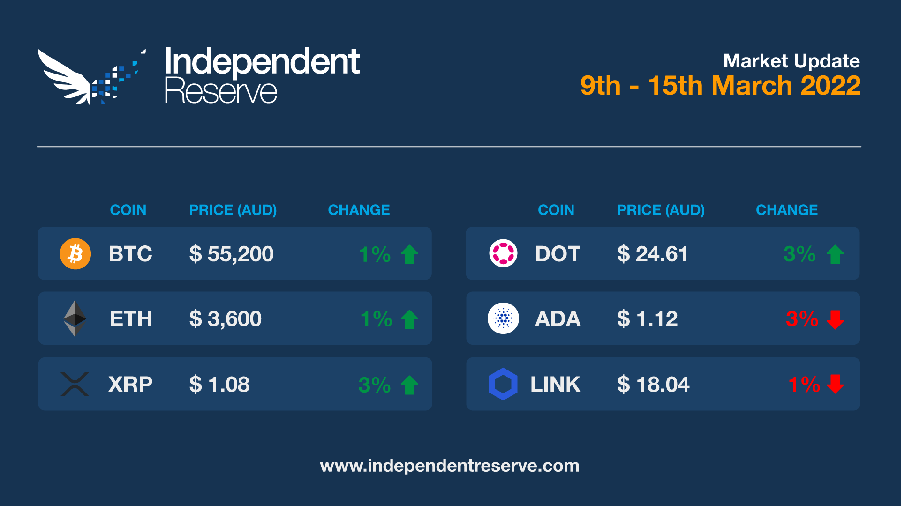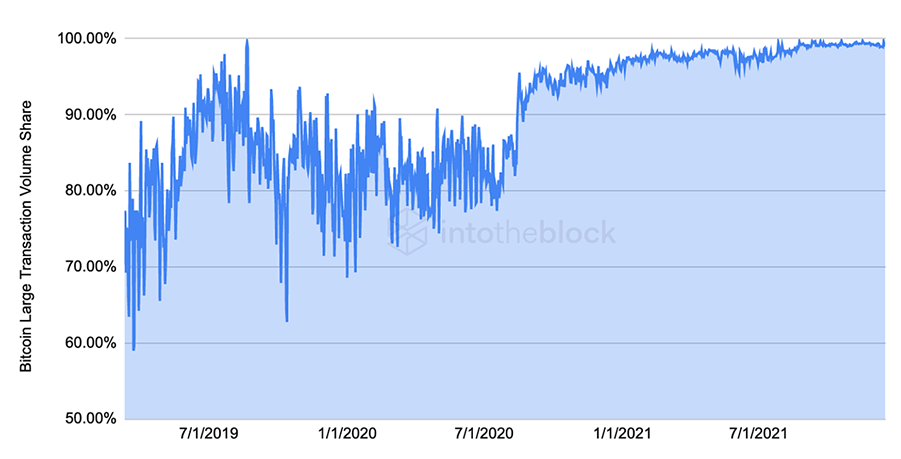In Markets
With inflation at a 40 year high in the US, and the Federal Reserve expected to start raising interest rates this week, Bitcoin’s ‘inflation hedge’ narrative is being put to the test. After a short-lived sugar rush from President Biden’s Executive Order, Bitcoin spent most of the week trundling along under US$40K (AU$55.6K), and it is currently flat on the last seven days, trading just around AU$55,200. Ethereum was up 1% to around AU$3,600 (US$2.5K), XRP gained 3%, Cardano is down 3% and Polkadot is up 3%. The Crypto Fear and Greed Index is at 23, or Extreme Fear, the same as last week.

From the IR OTC Desk
This week is all about US monetary policy and quite specifically, the US Federal Open Market Committee (FOMC) interest rate decision – which is scheduled for release Thursday morning at 5am (AEDT). Fed fund future pricing currently indicates slightly more than a 25bp hike, with the most recent commentary from Fed Chair Powell suggesting that his vote will also support a 25bp increase. Throughout the year we have highlighted diverging views from the voting FOMC members, hinting that policy discussions may be less than smooth this week. Any realised divergence from this forecast will prove significant for cryptocurrencies and global equities alike. Outside of the interest rate decision and the forward rate projections, it will be important to take note of any changes to the structure of the balance sheet and (if it were to be addressed at this month’s meeting) any forward guidance for quantitative tightening.
On the data front, US inflation continues to surge with the Inflation Rate YoY (Feb) printing at 7.9% (nearly 4x the 2% target!). Core Inflation Rate YoY (Feb) also moved higher to record 6.4% verse 6% in January. While much has been said about rising gasoline prices and their significant inflationary input, WTI crude has fallen nearly US$30 from its high to trade back towards US$100. This week sees: New Zealand Q4 GDP (Thursday); Australian February employment data (Thursday); European Union February inflation data (Thursday); and the Bank of England interest rate decision (Thursday). And of course, ongoing developments between and Russia/Ukraine.
On the OTC desk, risk reduction remains the dominant theme, with positive geopolitical and/or positive regulatory headlines, being used as a liquidity opportunity to de-risk. Customer enquiries into staking coins continue to increase – this week UST (Terra), Luna and DOT have seen the most enquiries. In a week jam packed with market moving economic data and ongoing Russia/Ukraine headlines, it remains difficult to see the immediate catalyst for a change in risk appetite – although in the cryptocurrency world, we know this can occur incredibly quickly.
For any trading needs, please don’t hesitate to get in touch.
In Headlines
EO is OK
The big news of the week was President Joe Biden signing an Executive Order about crypto which wasn’t anywhere near as bad as fears suggested. While short on specifics, the White House made encouraging noises to the effect that America “must maintain technological leadership in the digital assets space”. It essentially kicked the regulatory can down the road for 90 to 180 days while various federal agencies look into the issue and come up with proposals. The Blockchain Association’s head of policy Jake Chervinsky tweeted: “Anyone worried that President Biden’s executive order would spell doom and gloom for crypto can fully relax now.
South Korea’s new President
South Korea has a new crypto friendly President elect in the form of Yoon Suk-yeol. The conservative candidate has promised to deregulate the crypto industry, in contrast to his predecessor Moon Jae-in who closed all but a handful of exchanges. The new President wants to created blockchain Unicorns, introduce legislation to return crypto profits gained from illicit activity to victims and to dramatically increase the threshold for capital gains, meaning crypto investors could make US$40K (A$55.6K)in profit before paying tax.
Regulatory moves
Longstanding crypto critic Senator Elizabeth Warren has seized on fears that Russians might use crypto to evade sanctions, to draft a new bill that would make it easier to verify customer identities and transfers to private wallets. Democrat Congressman Rep. Brad Sherman submitted his own bill on the topic on March 13 that would: “impose sanctions with respect to the use of cryptocurrency to facilitate transactions by Russian persons subject to sanctions, and for other purposes.” It has no co-sponsors though and has been referred to a committee. Meanwhile crypto proponent Senator Cynthia Lummis has been pushing her ‘Responsible Financial Innovation Act’ which got a boost this week when Shark Tank star Kevin O’Leary met with lawmakers to discuss it. However, the bill is unlikely to go before Congress until after the midterm elections in November (if at all).
Big guys make big transactions
New data from IntoTheBlock shows that virtually all large value Bitcoin transactions are made by institutional investors. Institutional bitcoin trading now accounts for 99% of all transactions worth more than US$100K (AU$139K). Institutional interest in the market picked up in the third quarter of 2020 and ever since it has never accounted for less than 90% of large value transactions.

Bitcoin Large Transaction Volume Share | Source: IntoTheBlock
Stripe races into crypto
Payments giant Stripe has started supporting crypto again. It originally dropped BTC payments support in 2018 due to high fees. Now it’s diving head first back into the sector. “Stripe now supports crypto businesses: exchanges, on-ramps, wallets, and non-fungible token marketplaces,”co-founder John Collison wrote on Twitter on March 10. “Not just pay-ins but payouts, know-your-customer (KYC) and identity verification, fraud prevention, and lots more.”
EU Bitcoin mining bill fails
Last week we reported that a ban on Bitcoin’s Proof of Work mining system had been taken out of the proposed EU’s Markets in Crypto-Assets Directive (MiCA). The ban subsequently got put back in, but the vote by the EU’s parliament’s economic and monetary affairs committee came down against a ban, 32 to 24. The MEP’s instead voted for an alternative amendment that would make crypto mining fall under a classification system that establishes which technologies meet sustainability goals. This suggests PoW cryptocurrencies and miners could still face difficulties ahead in Europe.
Ripple smells victory
Ripple has a court victory this week, when a judge declined the SEC’s request to disallow Ripple’s fair notice defence. While anything could happen, it appears increasingly likely Ripple will win the case, at least according to General Counsel at Ripple, Stuart Alderoty: “Today’s order makes it clear there’s a serious question whether the SEC ever provided defendant with fair notice that its distributions of XRP – since 2013 – would ever be prohibited under the securities law.” Former SEC exec Joseph Hall agrees with that assessment and said recently he thought “there is a pretty good chance that [the SEC] will lose on the merits.”
The Merge is tested
Ethereum’s long awaited transition to Proof of Stake has moved one step closer to reality with the final public testnet called Kiln launching. It’s simulating the merge from Proof of Work to PoS sometime this week. “Let me tell it as honestly as I can: Kiln is THE BIG milestone for the Ethereum Merge,” Beacon Chain community health consultant “Superphiz” said. If Kiln is a success, then the other testnets currently running will also simulate the Merge and we will finally get a date for the actual Merge. More than 10 million ETH has already been staked in the Beacon Chain. When the Merge happens, energy consumption will be cut by 99.95% and annual supply inflation will be cut from 4.3% to 0.43%. With fees being burned, ETH will become deflationary.
Independent Reserve sponsors Blockchain Week event
Independent Reserve is proud to host an event as part of this year’s Australian Blockchain Week. The event will be hosted in Sydney, from 6pm on Tuesday, 22 March. The topic of the evening will be ‘How crypto & the blockchain are used in everyday life’. RSVP for the event and join 5 esteemed panellists discussing how they and others actually use and interact with crypto and the blockchain.
CBDCs won’t impact private stablecoins – Tether CTO
According to Tether CTO, Paolo Ardoino, Central Bank Digital Currencies (CBDCs) won’t have an impact on the private stablecoin market. Sharing his views on a Twitter thread last week, he said CBDCs would only replace the age-old centralised payment systems like SWIFT and utilise private blockchains to settle most transactions like credit/debit card flow. To further his point, he made clear that “FIAT is mostly digital already” and private stablecoins like USDT will remain relevant given the fact that users will be able to transfer across multiple blockchains, something CBDCs won’t do.
Until next week, happy trading!


